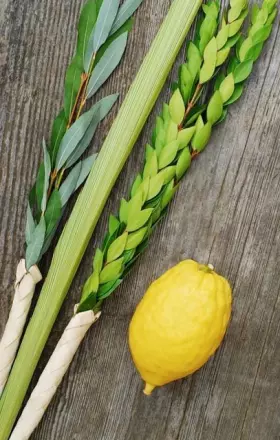Sukkot holiday
Sukkot is a week-long Jewish holiday that starts on the 15th day of the Hebrew month of Tishrei. It commemorates the Israelites' journey through the desert following the Exodus from Egypt and the construction of the Holy Tabernacle.
In Israel, the first day is considered a "yom tov" (יום טוב), a sacred day with restrictions similar to those of Shabbat. In the Diaspora, the first two days are considered as yom tov. The remaining days are called Chol HaMoed (חול המועד), during which certain forms of work and travel are permitted.
Sukkot is one of the three pilgrimage festivals (Shalosh Regalim - שלוש רגלים) with a requirement to visit the Holy Temple in Jerusalem. The Torah mentions the pilgrimage holidays multiple times, including in Leviticus 23:39:
"But on the fifteenth day of the seventh month, when you gather in the produce of the land, you shall celebrate the festival of the Lord for a seven day period; the first day shall be a rest day, and the eighth day shall be a rest day." (Leviticus 23:39)
אַךְ בַּחֲמִשָּׁה עָשָׂר יוֹם לַחֹדֶשׁ הַשְּׁבִיעִי, בְּאָסְפְּכֶם אֶת-תְּבוּאַת הָאָרֶץ, תָּחֹגּוּ אֶת-חַג-יְהוָה, שִׁבְעַת יָמִים; בַּיּוֹם הָרִאשׁוֹן שַׁבָּתוֹן, וּבַיּוֹם הַשְּׁמִינִי שַׁבָּתוֹן.
The word "Sukkot" (סוכות) is the plural form of Sukkah (סוכה), which means booth or tabernacle. The sukkah symbolizes the temporary shelters the Israelites lived in during their 40 years in the desert after the exodus from Egypt.
Commandments and traditions of Sukkot
- Pilgrimage to Jerusalem.
- Building a sukkah and living in it. Commonly meals are held in the sukkah.
- Blessing over the four species (see below) and being happy:
"And you shall take for yourselves on the first day, the fruit of the hadar tree, date palm fronds, a branch of a braided tree, and willows of the brook, and you shall rejoice before the Lord your God for a seven day period." (Leviticus 23:40)
- Sukkot is also a time of family gathering and hosting others in the Sukkah.

The four species
For the blessing for the four species, three plant branches and a citron are bundled in the following combination:
- One palm branch (Lulav - לולב)
- Two branches of willow (Arava - ערבה)
- Three branches of myrtle (Hadas - הדס)
- A citron (Etrog - אתרוג)
Thus, altogether 7 items are bundled as shown on the left. For the blessing, the etrog is held on the left hand and the branches on the right hand.
The blessing:
"ברוך אתה ה' אלוקינו מלך העולם אשר קידשנו במצוותיו וציוונו על נטילת לולב"
Mention of pilgrimage holidays in the Torah
"Celebrate three pilgrimage festivals to Me each year.
Keep the Festival of Matzahs. Eat matzahs for seven days, as I commanded you, during the prescribed time in the month of standing grain, since this is when you left Egypt.
Do not appear before Me empty-handed.
Also keep] the Reaping Festival, through the first fruits of your produce that you planted in the field. [There is also] the Harvest Festival [right after] the end of the year, when you gather your produce from the field." (Exodus 23:14-16)
Three times each year, every male among you must appear before God, Master [of the Universe]. (Exodus 23:17, 34:23)
Three times each year, all your males shall thus be seen in the presence of God your Lord in the place that He will choose: on the festival of Matzahs, on the festival of Shavuoth, and on the festival of Sukkoth. [In those times] you shall not appear before God empty-handed.
Each person shall bring his hand-delivered gift, depending on the blessing that God your Lord grants you. (Deuteronomy 16:16-17)